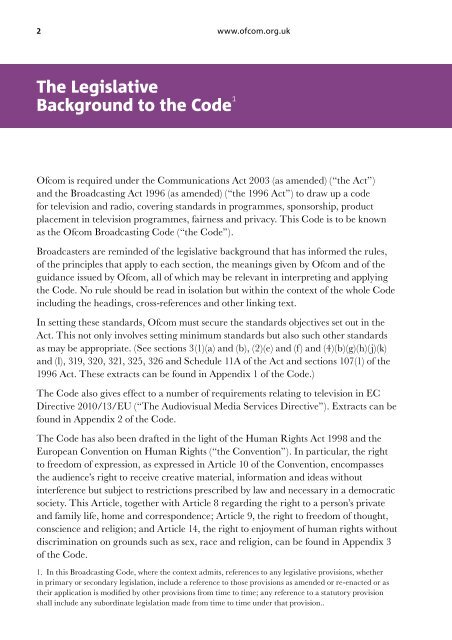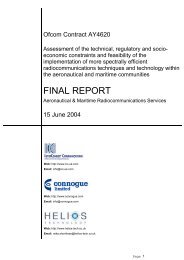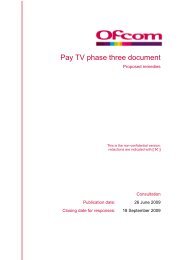THE OFCOM BROADCASTING CODE - Stakeholders
THE OFCOM BROADCASTING CODE - Stakeholders
THE OFCOM BROADCASTING CODE - Stakeholders
You also want an ePaper? Increase the reach of your titles
YUMPU automatically turns print PDFs into web optimized ePapers that Google loves.
2 www.ofcom.org.uk<br />
The Legislative<br />
Background to the Code 1<br />
Ofcom is required under the Communications Act 2003 (as amended) (“the Act”)<br />
and the Broadcasting Act 1996 (as amended) (“the 1996 Act”) to draw up a code<br />
for television and radio, covering standards in programmes, sponsorship, product<br />
placement in television programmes, fairness and privacy. This Code is to be known<br />
as the Ofcom Broadcasting Code (“the Code”).<br />
Broadcasters are reminded of the legislative background that has informed the rules,<br />
of the principles that apply to each section, the meanings given by Ofcom and of the<br />
guidance issued by Ofcom, all of which may be relevant in interpreting and applying<br />
the Code. No rule should be read in isolation but within the context of the whole Code<br />
including the headings, cross-references and other linking text.<br />
In setting these standards, Ofcom must secure the standards objectives set out in the<br />
Act. This not only involves setting minimum standards but also such other standards<br />
as may be appropriate. (See sections 3(1)(a) and (b), (2)(e) and (f) and (4)(b)(g)(h)(j)(k)<br />
and (l), 319, 320, 321, 325, 326 and Schedule 11A of the Act and sections 107(1) of the<br />
1996 Act. These extracts can be found in Appendix 1 of the Code.)<br />
The Code also gives effect to a number of requirements relating to television in EC<br />
Directive 2010/13/EU (“The Audiovisual Media Services Directive”). Extracts can be<br />
found in Appendix 2 of the Code.<br />
The Code has also been drafted in the light of the Human Rights Act 1998 and the<br />
European Convention on Human Rights (“the Convention”). In particular, the right<br />
to freedom of expression, as expressed in Article 10 of the Convention, encompasses<br />
the audience’s right to receive creative material, information and ideas without<br />
interference but subject to restrictions prescribed by law and necessary in a democratic<br />
society. This Article, together with Article 8 regarding the right to a person’s private<br />
and family life, home and correspondence; Article 9, the right to freedom of thought,<br />
conscience and religion; and Article 14, the right to enjoyment of human rights without<br />
discrimination on grounds such as sex, race and religion, can be found in Appendix 3<br />
of the Code.<br />
1. In this Broadcasting Code, where the context admits, references to any legislative provisions, whether<br />
in primary or secondary legislation, include a reference to those provisions as amended or re-enacted or as<br />
their application is modified by other provisions from time to time; any reference to a statutory provision<br />
shall include any subordinate legislation made from time to time under that provision..
















